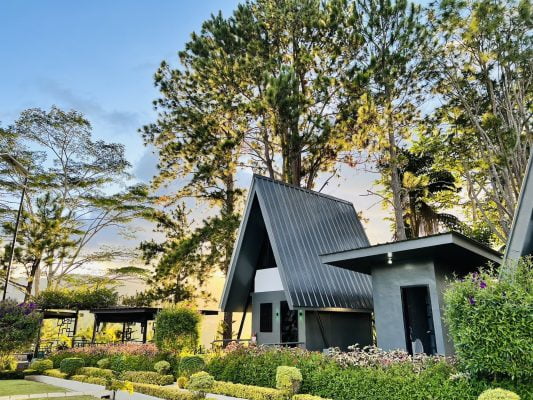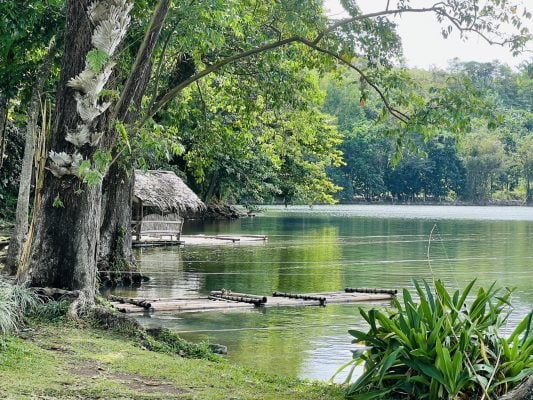
The first of its kind in the city, the Davao Crocodile Park was conceptualized by owner Phillip Dizon who was fascinated by saltwater and freshwater crocodiles. After finding out that raising them is a lucrative business and after obtaining a permit from the local government, Mr. Dizon put up what eventually became a must-see attraction in the city.
The park was established with state-of-the-art farming techniques, complete with modern equipment and farm lay-outs conducive for breeding the reptiles. It is aimed to attract more visitors to Davao City, provide a venue for citizens to have close encounters with wildlife, educate school children through tours and shows and create public awareness for wildlife conservation. Davao Crocodile Park also serves as a laboratory for students studying these creatures.
Arriving and Rates

Entrance to the park costs P200 for adults and P100 for children 12 years old and below. A ticket covers entrance to the park, the butterfly house and the Tribu Kamindanawon cultural village, all within the complex. The Butterfly House and cultural village are located outside of the actual park, a short leisurely walk from the entrance area.
Pangil and Other Creatures

The park is also home to other exotic animals and wildlife, some endemic to the Philippines. Among the species in the large collection are Albino Burmese Pythons, Siberian tigers, bear cats, orangutans, Oriental civets, ostriches, monitor lizards and a variety of bird species. Snakes, turtles and lizards are also bred within the complex. Petting of the animals are allowed but guests are encouraged to take the necessary precautions due to the unpredictable nature of the creatures. There are designated hours for petting the animals with trained staff of the park:
9:00 AM -11:00 AM - Animal Petting (Reptiles and Raptors)
3:00 PM - 5:00 PM - Animal Petting (Reptiles and Mammals)
Shows

3:15 - 3:30 - Crocodile Dancing
3:30 - 4:00 - Tightrope Walker and Stunts
4:00 - 4:30 - Pangil Encounter
4:30 - 4:45 - Crocodile Frenzy
4:45 - 5:00 - Crocodile Feeding
Other Attractions

Those who want a closer encounter with the animals may have their photos taken with them touching or even carrying a baby croc or an albino Burmese python. Visitors who’d rather not come too close to the animals may also have their photos taken at the mini-theme park where statues of the animals are standing.
Adrenaline junkies can also have the adventure of their lives by rafting down the Davao River. Wild Water Rafting is available for all skill levels, from beginners to expert thrill-seekers. The activity is considered safe; there are certified guides and proper gear are required before anyone gets on a raft. White water rafting is a thrilling activity that allows one to enjoy the lush greens along the river while listening to the rush of the water. Shooting through the rapids and learning how to paddle is an experience one will not soon forget.
Food at the Park

Outside the park are stalls selling food items like sandwiches, hotdogs and other easy to prepare snacks. The Sweet Spot, an ice cream shop, serves delicious homemade ice cream made from durian, croc eggs and dragon fruit, among others. Mount Apo Civet Coffee and Altura Arabica Coffee are can also be bought from the same shop at P150 per cup.
For those looking for a more conventional setting, the Riverwalk Grill serves the best exotic cuisine in the city. The restaurant is famous for their crocodile meat prepared in different ways including steaks, sisig (chopped meat on a sizzling plate) and kare-kare (stew in peanut sauce), among others. Ostrich egg omelets, which are usually good for three people, are also available as well as dragon fruit shakes.
There are a lot of reasons why people visit and always come back to the Davao Crocodile Park. It’s not just the crocodiles; after a time, one gets pretty bored with these creatures especially because all they do is sit around and wait to be fed. The experience of being close to these creatures is what draws people in. And then there’s the affordable cups of civet coffee, otherwise expensive in other coffee shops. Food at the Riverwalk also attract a lot of tourists. Whatever your reason for visiting the park, you’re in for a big adventure!
Downloadable Resources: For a closer look at Davao’s Crocodile Park, Philippine Traveler has prepared a photo review for you. The Davao’s Crocodile Park Review is available as a free PDF download or free Powerpoint download. Enjoy this review at your leisure or share it with a friend!
Philippine Traveler’s Rating:
[yasr_multiset setid=5]
[yasr_overall_rating]






